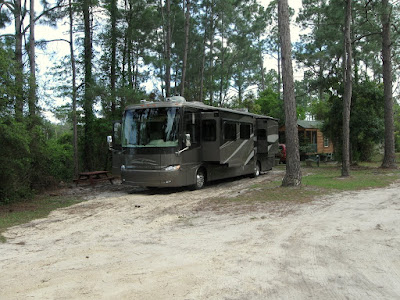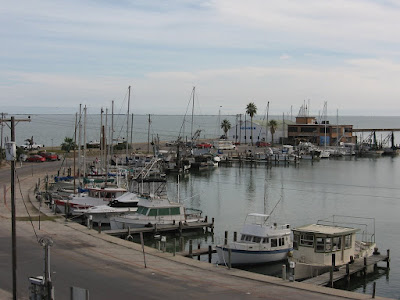At the end of June this year we started our 4th year as fulltime RV explorers. I thought this might be a good time to reflect on our decision to start this lifestyle, to write a little about what we've learned, and see what the future may hold. This is Part 2 -- Learnings.
------------
Over the past three years of living life as modern day nomads we've learned a thing or two about this RV'ing life. Mostly observations and opinions, they're our take on this lifestyle.
First off, let's talk about the concept of compromise. As part of the human condition we all live with compromise on a daily basis. It's what happens when boundless imagination and desire runs headlong into limits. We may want the mansion on the hill... but our financial resources say "no way" and we settle (compromise) for a 3 bedroom bungalow on the wrong side of town. We may want to run the Boston Marathon... but that pot-belly and those flabby muscles say "are you kiddin' me?" and we compromise for a run/walk 5k. Compromise is part of our daily lives.
Well, this concept of compromise really asserts itself, really comes into play, when you're talking about RV living. I mean just the idea, of a self-contained house that you can take with you on vacation, that you can drive down the highway, is pretty bizarre when you think about it. There are a lot of limits that are imposed on the owner of one of these things -- to legally be on the highway it must fit into state imposed limits on length, width, and weight. There's a limited and very small amount of storage for your stuff. For many, living in one of these things is like trying to stuff 10 pounds into a 5 pound box. So as we work through our list of learnings below, keep in mind that this concept of compromise plays a huge roll in the life of a fulltimer.

We've learned that we prefer "camping" as opposed to "RV parking". Here's a stereotypical description of each: "camping" is being in the woods or forest with campsites separated by natural growth and a lot of space... where you can feel like you're living in nature... where you can leave the window shades open at night... where you can have a campfire... where you can feel secluded from the watchful eyes of others. At campgrounds, it's not uncommon to have no hookups at all... or, if you're lucky, maybe minimal electric power. It's usually necessary to fill your freshwater tank on the way in to your campsite and visit the dump station on the way out.

On the other extreme is parking at RV parks and resorts, where the sites are asphalt or the highly prized concrete pad. These are often antiseptic places where old, tired, and shabby RV's are banned. You'll be neatly parked in perfect lines... so close to your neighbor that you can conveniently pass the gray poupon mustard from camper to camper without stepping outside... where you must close the shades at night, for privacy and to keep the high-intensity security lighting out... where nature is something to be trimmed, controlled, and kept away... where you feel the eyes of others every time you step outside. RV Parks usually have full hookups with 50amp electric service. And RV parks are usually very social -- it's hard to step outside the RV without attracting the attention of neighbors and being drawn into conversation.

In fairness, between the two extremes described above, there are all sorts of variations and permutations. In fact, some places are hard to classify as one or the other... they're really hybrids with some of the best (or worst?) of each. Here's a litmus test if there's any doubt about whether it's a campground or an RV park: if you feel comfortable peeing in the bushes at the edge of your site, you're probably camping.
Despite a preference for one or the other, often your circumstances affect where you choose to overnight. Even though we prefer camping we often choose to stay in RV parks. Sometimes it's the only option. Other times the convenience of full hookups trump more rustic options... especially when planning to be one place for an extended time. It's really a matter of preference, circumstance, and compromise. Some people love the atmosphere of RV parks... love having lots of amenities, planned activities, and the social atmosphere. But we've found that normally, everything else being equal, we prefer the solitude of camping and being close to nature.

Another thing we've learned is that the bus-house is both too small and too big. How can this be Thom? Closely associated with the "camping versus RV parking" thing, the size of an RV is a huge compromise issue. Most people want the largest RV they can get in order to have room and storage space for themselves, their pets, their stuff, and all their toys -- in an effort to hang onto at least some of the feel of a fixed house. I mean, after all, this is America and bigger is always better. But big RV's, known as 'big rigs" in the RV'ing community, can really limit your mobility, spontaneity, and where you can and can't go. Ah!... compromises.

As we drive down the road we're close to 60 feet long, 8-1/2 feet wide (not counting mirrors, awnings, etc), over 12 feet high, and we weigh about 34,000 pounds... not as big as a regular fixed house but at times it feels like it. Whenever we have our car in tow we can't back up to escape from problems or make a U turn... we'd have to unhook the car, move the bus, and then re-hook the car. Because of the long wheelbase and the long rear overhang on the motorhome you've got to beware of sharp dips and inflections in the road surface that can easily cause you to drag your rear end or, worse, high-center the rig (picture a motorhome hung up and balanced in the middle so the front and rear wheels are off the ground). This is not the kind of vehicle to have if you want to, on a whim, head down narrow unpaved rustic roads, find out of the way forest service campgrounds high in the mountains, or venture very far off paved State and US highways.
Whenever we're looking for a place to camp that's more rustic or out of the way, we really do our homework... what are the roads like leading into the campground?.. any bridge clearance or weight restrictions?.. does the campground have length restrictions? are the sites level? do other big rigs use the campground? But despite our best efforts at gathering the necessary information we've still run into problems with maneuvering around trees, tight turns, and untrimmed trees. We carry a collapsible tree trimmer on board and have often used it to clear the way to a campsite -- to hack our way in and then hack our way back out again. Budget constraints have strained the budgets of public campgrounds (Forest Service, National Parks, Corps of Engineers, State Parks) and we've learned that tree trimming is easily
trimmed to save a few bucks.
But remember, it's all about compromise. While we often think the bus-house is too big... we also like the room we have. When two people are living in a small space like an RV, adequate room is very important. But we've also learned that other factors are even more important. We've developed a little adage over the years to explain what we've learned about this: If you and your mate crave travel and adventure, are tolerant, light-hearted, flexible, thoughtful, and can easily compromise, you'll be able to live quite well, perhaps even harmoniously, in spaces even smaller than the 300 sq. feet offered by the bus-house. But if even just one of you is high-maintenance, selfish, narcissistic, egotistic, unable to compromise, or is cool to the whole idea of travel and adventure... there's not an RV big enough for two people to find happiness.

We can't overstress the importance of having a compatible partner to have any chance of success in this lifestyle. Despite both of us being excited by and desiring this lifestyle, and both of us being pretty much "in sync" and tolerant and all that, we've still had a few problems along the way. But we've worked them out and learned from them.
[I guess we've learned more than I thought. The next post will be
more things we've learned during the past three years.]
[Go To Part 1]
[Go To Part 3]
Thom & Dar































